15 Oct 2020 | China, India, News, Pakistan
[vc_row][vc_column][vc_column_text]The Indian government’s revocation of autonomy for Jammu and Kashmir has been a disaster for free speech.
In October 2019, Narendra Modi’s government rescinded article 370 of the Indian constitution which had given the region special autonomous status since 1954. The region is now run as two separate union territories – Ladakh, and Jammu and Kashmir.
Ever since its autonomy was curtailed, access to information for inhabitants has been greatly reduced.
Despite palpable risks to their safety, journalists in the disputed region have remained, but a lack of access to internet has hindered their progress.
Set in the Himalayas, the region is famously beautiful – often described as “heaven on Earth” – but this is in stark contrast to the fierce and often bloody dispute wracking Jammu and Kashmir.
As the situation worsens, we look back at pieces published in Index magazine and online exploring the impact the conflict has had on free speech, journalists and the people who call Kashmir their home.
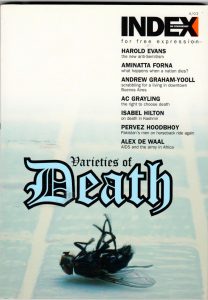
Varieties of death, the winter 2002 issue of Index on Censorship magazine.
Journalist and broadcaster Isabel Hilton visited Kashmir in the early 2000s. She documented her experiences in 2002 and spoke of her encounters with Pakistani military.
The piece is an insight into how much of major conflicts can seem underreported, but in fact are not. For journalists working in the region, the daily reports of death tolls and atrocities are both a livelihood and a duty, but only major events tend to make headline news across the world.
She wrote: “In Srinagar, the journalists — themselves constantly threatened and often attacked by both sides — have grown weary of looking for new angles on death. Only the larger outrages — such as the car bomb attack on Srinagar’s assembly building on 1 October last year which claimed more than 30 lives — are reported internationally.”
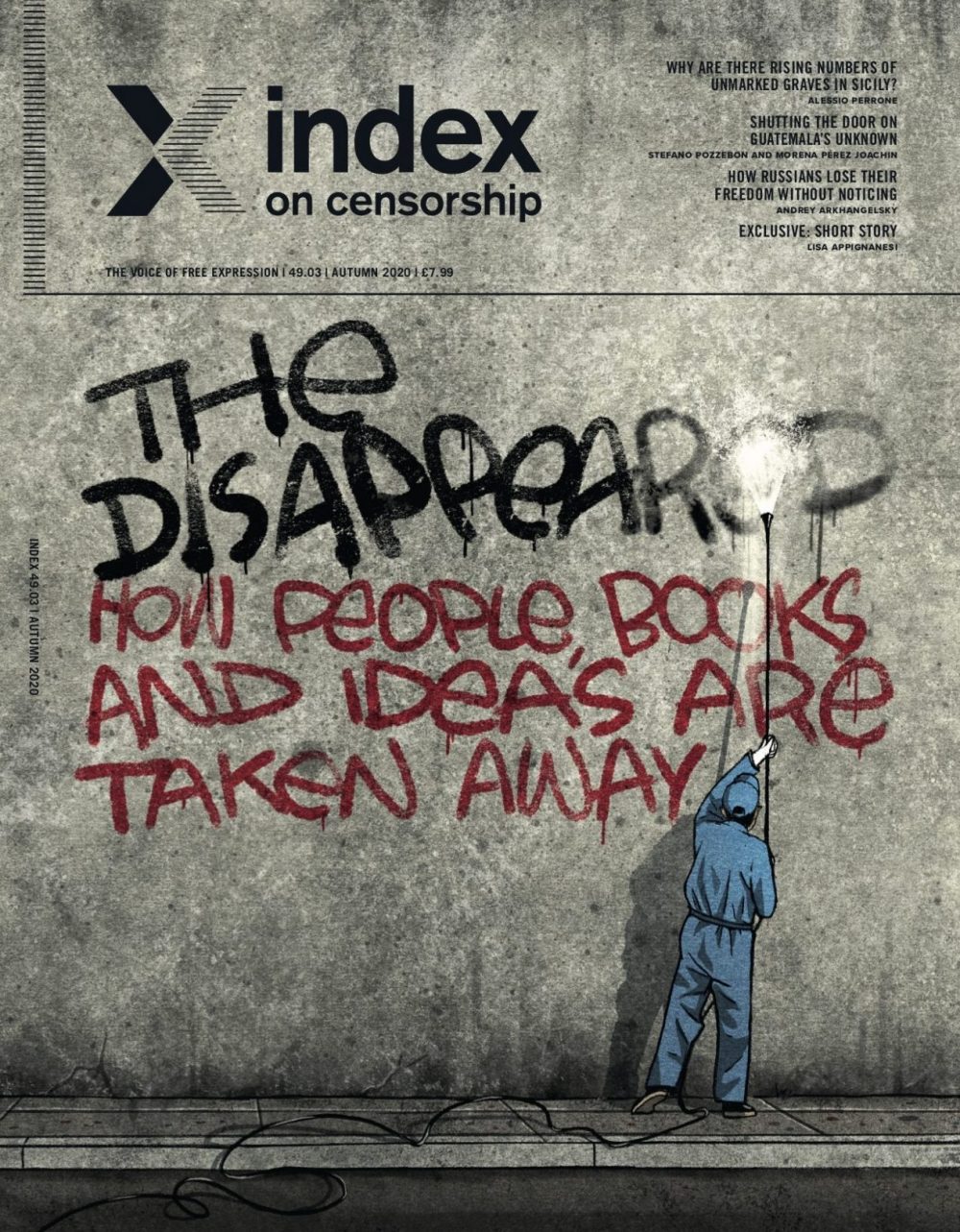
Index on Censorship autumn 2020 issue on the theme of the disappeared
In the most recent edition of Index (which can be read here), Bilal Ahmad Pandow discussed the experiences of journalists in Kashmir.
Since India took control and imposed direct rule, a feeling of (relative) security in the region has been lost and censorship laws have taken a firm grip, he writes.
A new policy for journalists introduced this year by the Jammu and Kashmir government imposes rules on restricting “fake news, plagiarism and unethical or anti-national content”.
“Pressure on media freedom was ratcheted up even further with the introduction of the New Media Policy 2020. Journalists were, of course, already operating under tremendous pressure – harassment, intimidation, the choking of advertisement revenue, imprisonment, draconian laws and a communication blockade – all of which are forcing journalists to self-censor.”
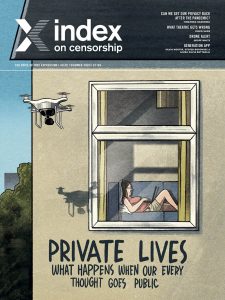
Index on Censorship summer 2020 issue on the theme of privacy
Earlier this year, Kashmiri journalist Bilal Hussain spoke with Index’s Orna Herr on life in the media in the region.
He told Herr of his personal struggles to get copy and videos past online restrictions and out of the country. Journalists have been creative in their attempts to get past the internet blocks designed to limit media freedom, he said.
“Since March 2020, the government allowed restricted internet access that blocked many news websites. So journalists installed VPNs that could break the firewall and enabled journalists to access those websites.”
“Some journalists used to travel to Delhi to access the internet and came back after filing their reports.”
“To get video interviews to my editor in Paris, I put them on a memory stick and gave it to a friend who was travelling to the USA, and he sent it on from there.”

Varieties of death, the winter 2002 issue of Index on Censorship magazine.
Poet Agha Shadid Ali was born in Kashmir in 1949. He moved to the USA in 1976 but his home was always at the forefront of his literary works.
His 1997 work Country Without a Post Office discussed the plight of Kashmir. At the time of their publication, he said: “My entire emotional and imaginative life began to revolve around the suffering of Kashmir.”
Ali died of brain cancer in 2001. Index included two of his poems following the 2002 Kaluchak massacre in which militants attacked a tourist bus, killing 31 people and injuring 47.
[/vc_column_text][/vc_column][/vc_row][vc_row][vc_column][vc_column_text]

Media moguls & megalomania, the September 1994 issue of Index on Censorship magazine
This piece from 1994 by Caroline Moorehead shows how the human rights spotlight was finally being turned onto Jammu and Kashmir.
She writes: “In their war against the militants…the Indian police and security fores have come to treat disappearances with a combination of lethargy, obfuscation and threats, connived at by the judiciary. Court orders are ignored, relatives warned to stop making enquiries, and the case is shifted from place to place while documents are mislaid and those responsible posted to other places.”
It tells the story of the disappearance of 22-year-old Harjit Singh, a far from unusual story in the region.[/vc_column_text][/vc_column][/vc_row][vc_row][vc_column][vc_column_text]
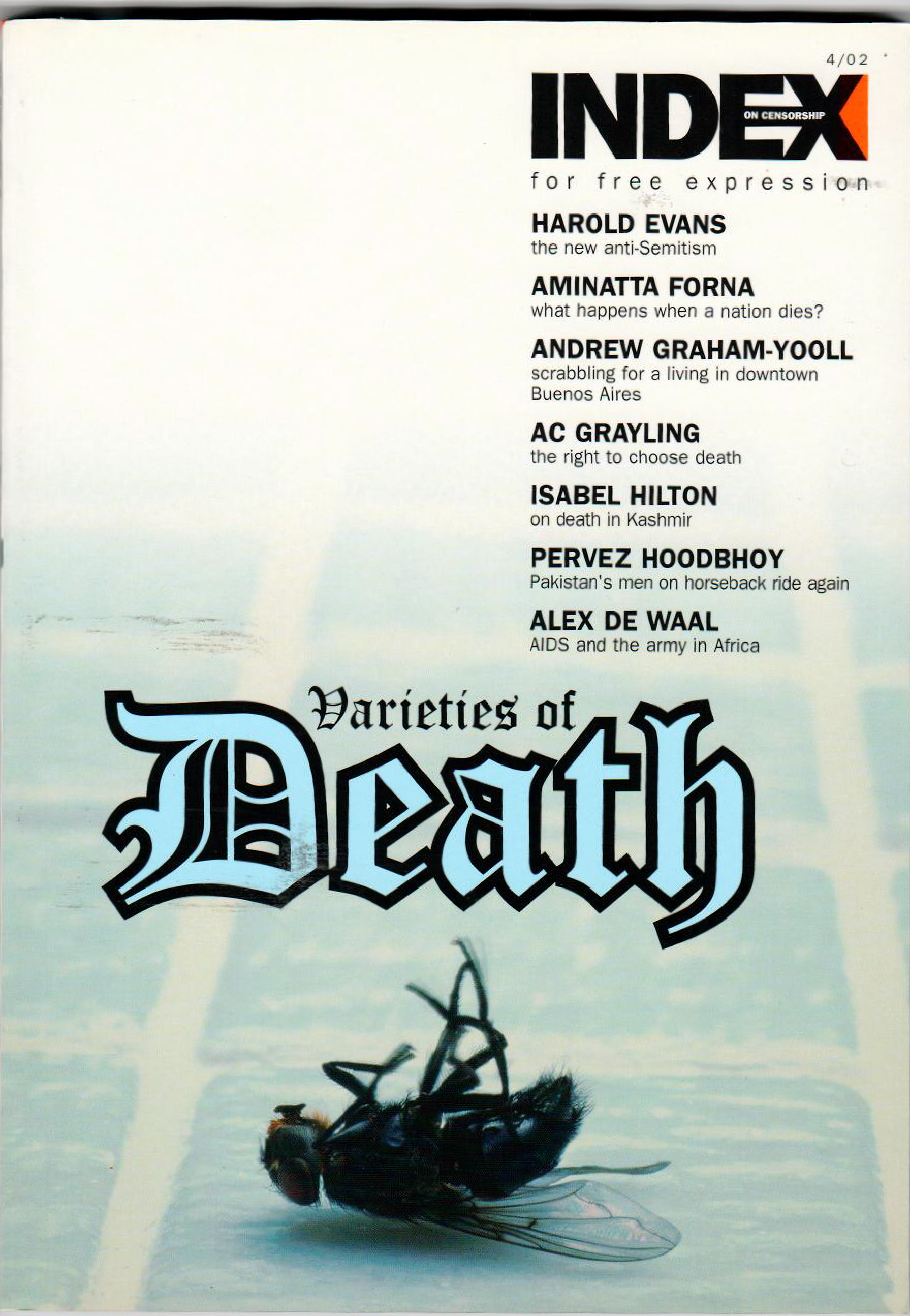
Varieties of death, the winter 2002 issue of Index on Censorship magazine.
Beyond the Gun is a collection of photographs and statements from Kashmiri people in 2002. Its emotive language and testimony from residents who felt betrayed by India’s handling of the region, coupled with photographs of members of the community, make for a stirring read.
By Sheba Chhachhi, each photograph and collected testimony tells a different story. Some, like the words from carpet worker Jana, show the danger of bringing to light the problems caused by local authorities and provides a chilling account of escaping molestation by a border security force soldier.
Jana said: “I faced the power of his gun with the power of my mind. I felt no fear. I had the axe. Had the axe not been there; there was a rolling pin, a ladle. If I had a gun, they would have seized it long ago. These are my own implements. No one can take them away from me.”[/vc_column_text][/vc_column][/vc_row][vc_row][vc_column][vc_column_text]

Partition, the November 1997 issue of Index on Censorship magazine
In 1997, Pakistan and India celebrated 50 years of independence, but continuing tensions between the two muted the festivities.
In this article from that year, Eqbal Ahmad set out the problems caused by a misguided approach to decolonisation by the United Kingdom, which led to the partition of Pakistan and Bangladesh.
Though not specifically about the troubles in Kashmir, much of the hostility between Pakistan and India is thoughtfully explained and ensures a greater understanding of the conflict.[/vc_column_text][/vc_column][/vc_row][vc_row][vc_column][vc_column_text]

Varieties of death, the winter 2002 issue of Index on Censorship magazine.
In this 2002 article, Sidharth Bhatia claims India once had the world’s largest and freest media, something which has now changed. It takes a historical journey explaining chronologically just how India’s media freedom has been squeezed.
Bhathia ponders the problems populist jingoism can have on freedoms, citing the border war in 1999 as a prime example.
“More worrying is the decline in any challenge to the received wisdom on contentious issues such as human rights abuses, especially in Kashmir. This was seen at its most blatant during the border war at Kargil in 1999 between Indian and Pakistani soldiers (disguised as irregulars) who had infiltrated the area.”[/vc_column_text][/vc_column][/vc_row][vc_row][vc_column][three_column_post title=”You may also like to read” category_id=”581″][/vc_column][/vc_row]
23 Jul 2020
In March the first ever issue of the magazine is published under the title Index (“on Censorship” is later added). From the beginning, Index declare its mission to stand up for free expression as a fundamental human right for people everywhere. It is particularly vocal in its coverage of the oppressive military regimes of southern Europe and Latin America, but is clear that censorship is not only a problem in faraway dictatorships. The first issue includes a never-before-published poem, written while serving a sentence in a labour camp, by Soviet dissident Aleksandr Solzhenitsyn, who went on to win a Nobel prize later that year. Articles are published from across the globe, including Bangladesh, Brazil, Greece, Portugal, USA, the Soviet Union, with poems from Natalya Gorbanyevskaya, a poet who had been confined to a mental hospital. It also includes the first publication in any language of a story by Milovan Djilas, who was unable to publish anything in his own country since his trial in 1963.
Also included in the first issue is the Index “Index”, which is round-up of the main and most recent free speech issues around the world. Index Index runs in every issue until 2008.
In the September issue, Nadine Gordimer, a South African writer, political activist and recipient of the 1991 Nobel Prize in Literature, writes her first article for Index. Gordimer stands firmly against apartheid in South Africa. She goes on to write for Index many times.
11 Jun 2020 | Statements
President Donald Trump
The White House
1600 Pennsylvania Avenue, NW
Washington, DC 20500via emailDear President Trump,We are writing to you as journalists, press freedom organizations, and industry groups to express our deep dismay at the recent violence perpetrated against journalists in the United States as they have sought to report on mass protests across the country. On behalf of the 72 groups listed below, we urge you to speak out forcefully against these attacks and in support of the rights of journalists to report freely, as guaranteed by the First Amendment of the U.S. Constitution.
The United States’ history of protecting free expression and defending and protecting the rights of journalists is much admired beyond U.S. borders. This is born out of a recognition that journalists serve as independent monitors of social and political developments, and are essential to democracy, transparency, and accountability.
Attacks on journalists in the U.S. threaten to undermine this commitment. The U.S. Press Freedom Tracker has received reports of at least 320 violations of press freedom across the country since protests demanding an end to police brutality and calling for social justice broke out on May 26. It is vital that state and local government officials take steps to ensure such violations never happen again, and that the perpetrators are held to account.
We call on you to send a clear and unambiguous message across the country and around the world about the importance of the press freedom and work of the press. Local leaders need to hear unambiguously from you that they have a responsibility to fully investigate these attacks, protect journalists, and ensure that they can work unobstructed and without fear of injury or reprisal.
Press freedom in the United States is critical to people around the world. Thousands of foreign correspondents are based in Washington D.C. and throughout the U.S., where they are tasked with telling the story of America to their publics back home. The ability of journalists to work freely in the U.S. creates a more enlightened global citizenry.
What happens in the United States also has repercussions for journalists around the world, including American correspondents. When the U.S. backslides it sends a green light to authoritarian-leaning leaders around the world to restrict the press and the free flow of information.
Authoritarian regimes in China, Iran, and Turkey have already opportunistically spoken out about the heavy-handed police tactics used here, using the crackdown on the press in this country to legitimize their own repression of independent journalism.
Instead of condemning journalists and the media, we urge you to commend and celebrate them as the embodiment of the First Amendment, which is the envy of so many countries around the world.
Sincerely,
Acclaim Nigeria Magazine (ANM)
Afghanistan Journalists Center (AFJC)
Aliansi Jurnalis Independen (AJI) Indonesia
Americans for Democracy and Human Rights in Bahrain
Arab Reporters for Investigative Journalism (ARIJ)
ARTICLE 19
Associação Brasileira de Jornalismo Investigativo (Abraji)
Association for International Broadcasting
Bangladesh NGOs Network for Radio and Communication
Bytes 4 All
Cairo Institute for Human Rights Studies
Cambodian Center for Human Rights (CCHR)
Canadian Media Lawyers’ Association
Cartoonist Rights Network International (CRNI)
Centre for Law and Democracy
Centre for Media Studies and Peacebuilding (CEMESP)
Committee to Protect Journalists
Community Media Forum Europe (CMFE)
DW Akademie
Free Media Movement – Sri Lanka
Free Press Unlimited
Freedom of Expression Institute (FXI)
Fundación Gabo (Gabriel García Márquez Foundation)
Fundación para la Libertad de Prensa (FLIP)
Global Forum for Media Development (GFMD)
Global Investigative Journalism Network (GIJN)
Global Voices
Hong Kong Journalists Association
Independent Journalism Center
Independent Journalism Center (IJC)
Index on Censorship
Initiative for Freedom of Expression – Turkey (IFoX)
INSI – international News Safety Institute
Institute for Regional Media and Information
Instituto Prensa y Sociedad Venezuela
International Center for Journalists (ICFJ)
International Federation of Journalists
International Media Development Advisers (IMDA)
International Media Support (IMS)
International Press Institute
International Women’s Media Foundation
Internews
Media Focus International (MFI)
Media Foundation for West Africa
Media Institute Southern Africa – Zimbabwe
Media Matters for Democracy (MMFD)
Media Watch
Media, Entertainment & Arts Alliance (MEAA)
Metamorphosis Foundation
Newsgain
Norwegian PEN
Organized Crime and Corruption Reporting Project (OCCRP)
Pacific Islands News Association (PINA)
Pakistan Press Foundation
Palestinian Center for Development and Media Freedoms (MADA)
PEN America
PEN International
Press Union of Liberia
Project Syndicate
Pulitzer Center on Crisis Reporting
Reporters Without Borders
Rory Peck Trust
Rural Media Network Pakistan
Samir Kassir Foundation – SKeyes Center for Media and Cultural Freedom
SembraMedia
Social Media Exchange (SMEX)
Somali Media Women Association (SOMWA).
South East Europe Media Organisation (SEEMO)
South East European Network for Professionalization of Media (SEENPM)
The Center for Independent Journalism, Romania
World Association of Community Radio Broadcasters (AMARC)
World Association of News Publishers (WAN-IFRA)
CC:
Vice President Michael R. Pence
Kayleigh McEnany, White House Press Secretary Ambassador
Kelly Craft, U.S. Permanent Representative to the United Nations
14 May 2020 | Covid 19 and freedom of expression, News
[vc_row][vc_column][vc_column_text]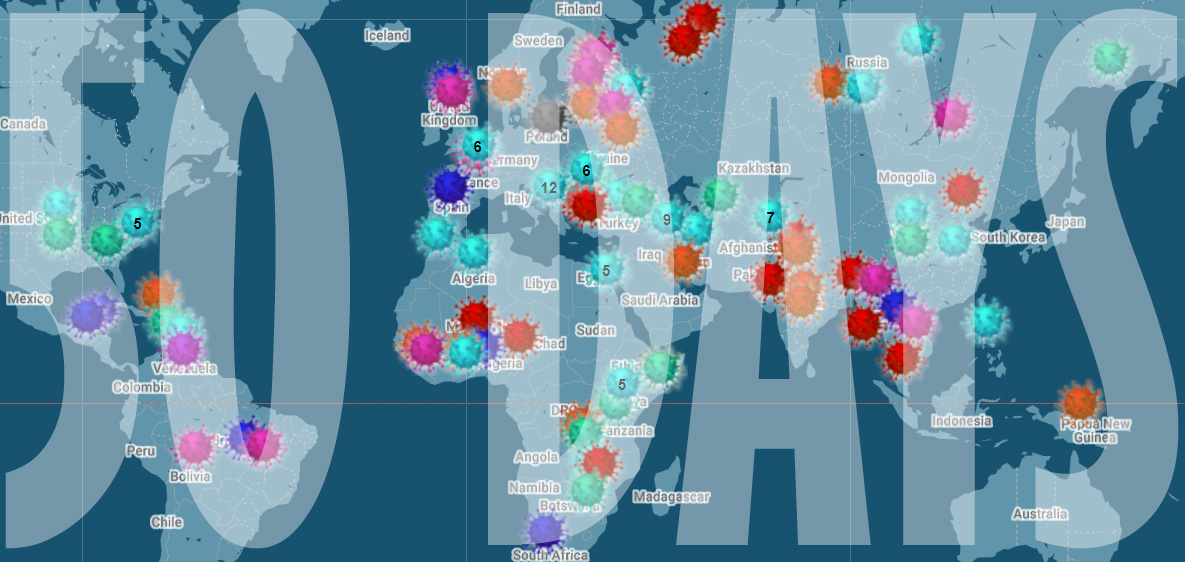
As we mark 50 days since we first started collating attacks on media freedom related to the coronavirus crisis, we’re horrified by the number of attacks we have mapped – over 150 in what is ultimately a short period of time.
We know that in times of crisis media attacks often increase – just look at what happened to journalists after the military coup in Egypt in 2013 and the failed coup against Recep Tayyip Erdogan in Turkey in 2016. The extent of the current attacks, in democratic as well as authoritarian countries, has been a shock.
Our network of readers, correspondents, Index staff and our partners at the Justice for Journalists Foundation have helped collect the more than 150 reports media attacks.
But these incidents are likely to be the very tip of the iceberg. When the world is in lockdown, finding out about abuses of power is harder than ever. Journalists are struggling to do their job even before harassment. How many more attacks are happening that we don’t yet know about? It’s a scary thought.
Rachael Jolley, editor-in-chief of Index on Censorship, said: “We are alarmed at the ferocity of some of the attacks on media freedom we are seeing being unveiled. In some states journalists are threatened with prison sentences for reporting on shortages of vital hospital equipment. The public need to know this kind of life-saving information, not have it kept from them. Our reporting is highlighting that governments around the world are tempted to use different tactics to stop the public knowing what they need to know.”
Index is alarmed that the attacks are not coming from the usual suspects. Yes, there have been plenty of incidents reported in Russia and the former Soviet Union, Turkey, Hungary and Brazil. At the same time there have been many incidents in countries you would not expect to see – Spain, New Zealand, Germany and the UK.
The most common incident we have recorded on the map are attacks on journalists – whether physical or verbal – and cases where reporters have been detained or arrested. There have been more than 30 attacks on journalists, with the source of many of these being the US President Donald Trump. He has a history of being combative with the press and decrying fake news even where the opposite is the case and the crisis has seen a ramped up attempt at excluding the media. During the crisis, he has refused to answer journalists’ questions, attacked the credentials of reporters and walked out from press conferences when he doesn’t like the direction they are taking.
We have also seen reporters and broadcasters detained and charged just for trying to tell the story of the crisis, including Dhaval Patel, editor of the online news portal Face of Nation in Gujarat, Mushtaq Ahmed in Bangladesh and award-winning investigative journalist Wan Noor Hayati Wan Alias in Malaysia.
Since we started the mapping project, we have highlighted other specific trends. Orna Herr has written about how coronavirus is providing pretext for Indian prime minister Narendra Modi to increase attacks on the press and Muslims. Jemimah Steinfeld wrote about how certain leaders are dodging questions while we have also looked at how freedom of information laws are being suspended or deadlines for information extended.
Although the map does not tell the whole story it does act as a record of these attacks. When this crisis is finally all over, it will allow us to ask questions about why these attacks happened and to make sure that any restrictions that have been introduced are reversed, giving us back our freedom.[/vc_column_text][/vc_column][/vc_row][vc_row][vc_column][vc_btn title=”Report an incident” shape=”round” color=”danger” link=”url:https%3A%2F%2Fforms.gle%2Fhptj5F6ZvxjcaGLa7|||” css=”.vc_custom_1589455005016{border-radius: 5px !important;}”][/vc_column][/vc_row]









